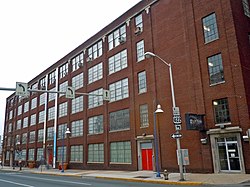GoggleWorks
Willson, Thomas A. and Co. | |
 | |
| Location | 201 Washington St., Reading, Pennsylvania |
|---|---|
| Coordinates | 40°20′20″N 75°56′9″W / 40.33889°N 75.93583°W |
| Built | 1871 |
| Architect | Muhlenberg Brothers |
| Architectural style | Moderne |
| NRHP reference No. | 06000428 [1] |
| Added to NRHP | May 24, 2006 |
 | |
 | |
 | |
| Established | 2006 |
|---|---|
| Location | 201 Washington St., Reading, Pennsylvania |
| Type | Art Center |
| Visitors | 250,000 anuually (free admission) |
| Executive director | Levi Landis |
| Nearest parking | On-site, rear of building (no charge) |
| Website | goggleworks |
GoggleWorks Center for the Arts is a community art and cultural resource center located in Reading, Pennsylvania. The mission of the GoggleWorks is “to transform lives through unique interactions with art.” [2]
Located in the former Willson Goggle Factory building, GoggleWorks Center for the Arts features eight teaching studios in ceramics, hot and warm glass, metalsmithing, photography, printmaking, woodworking and virtual reality; 35 juried artist studios; and headquarters of over 40 cultural organizations. GoggleWorks also includes several exhibition galleries, a 130-seat film theatre, a bar/restaurant, and store featuring handcrafted works by over 200 artists working within the building and beyond. Admission (excluding special events) and parking are always free.
The building was added to the National Register of Historic Places in 2006.[3]
History of the GoggleWorks Building
Founded by Gile J. Willson and his son Dr. Thomas A. Willson in 1871, Thomas A. Willson & Co. opened the first factory in the world to manufacture optical glass for lenses and reading glasses.[3] Located at the corner of Washington and 2nd streets in Reading, Pennsylvania, the company became known for its innovative strides in addressing the occupational hazards faced by factory workers and is credited with launching the safety protection industry. Their first innovation was a protective lens that blocked dangerous and blinding rays produced by metal processing equipment. During the 1890s the company expanded the reach of the safety industry addressing hearing, respiratory and head protection equipment.

The National Safety Council was created in 1913, and T.A. Willson & Co. Inc. Helped to set the uniform safety standards in industry. Through the 1920s, they expanded their line of safety equipment to the protection of coal miners, military personnel, and aviation. In 1929 the company became Willson Goggles, Inc., and by World War II, Willson Goggles was helping the war effort by making aviator goggles and high altitude oxygen masks for pilots in the military. In 1926, the company again changed its name to reflect an expanding product line. Willson Products, Inc. began to produce fashionable sunglasses, Willsonites, as modeled by the contestants of the 1938 Miss America pageant, and swim goggles, as worn by Florence Chadwick, who in 1950 was the first woman to swim both directions of the English Channel.
The company changed hands in 1956, but maintained the Willson products name through the atomic age and space age, still leading the safety industry in research and development of equipment to meet the needs of a technologically advancing society.
In the 1980s, Willson shifted its focus to the development of new varieties of respirators, gloves and other protective equipment. In 1989, Dalloz bought Willson products, and changed the company name to Dalloz Safety in 1997. Dalloz closed the plant in May 2002.
GoggleWorks Center for the Arts: 2005- Present
In 2005, the concept of the GoggleWorks was the brainchild of Albert Boscov, Marlin Miller, and Irv Cohen. It opened its doors on September 18, 2005.[4] In the October/November 2006 issue, American Crafts comments:
"Combining Boscov’s flair for promotion (he was chairman of the Boscov’s department store chain) with Miller’s longtime involvement in the craft world as a collector and advocate (he’s currently board chair of the Haystack Mountain School of Crafts), they envisioned a broad-based arts center built around artists’ studios... [T]he city got behind the idea, as did the state, which gave three million dollars in initial funding."
At 145,000 sq feet the GoggleWorks campus comprises the country's largest interactive visual art center.[5]. The complex also includes a 131-seat theatre, which presents art house films daily, a café, and store, which retails the work of over 200 individual artists from around the country.[6]
Past executives include Diane Labelle and Phil Walz.[7][8] Levi Landis, previously the executive director of the Philadelphia Folk Festival, was hired in 2016.[9] Landis aggressively sought new funding [10] and the Board undertook a strategic plan to reinvent program operations, launch new studios, and focus on long-term sustainability, which eventually led to the first annual financial surplus for GoggleWorks.[11]
Programs and Initiatives
GoggleWorks, which is open from 9am to 9pm daily,[12] offers rotating exhibitions and courses each semester in its studios along with other programs such as private workshops, Handcrafted Home, You Create We Make, Student Ambassador Fellowship, studio rentals, After School Arts Program (ASAP), scholarships, and continuing education for universities.[13] New programs include the A.R.T. program for disabled artists [14] and a new restaurant.[15]
See also
- Red Men Hall: Another Reading building designed by the Muhlenberg Brothers.
References
- ^ "National Register Information System". National Register of Historic Places. National Park Service. March 13, 2009.
- ^ "About". GoggleWorks. Retrieved 2020-04-26.
- ^ a b "National Historic Landmarks & National Register of Historic Places in Pennsylvania" (Searchable database). CRGIS: Cultural Resources Geographic Information System. Note: This includes Shelby Weaver Splain and Doug Scott (January 2006). "National Register of Historic Places Inventory Nomination Form: Reading Knitting Mills" (PDF). Retrieved 2012-08-22.
- ^ GoggleWorks Center for the Arts: About, ARTINFO, 2008, archived from the original on 2012-03-19, retrieved 2008-07-11
- ^ "Goggleworks Center for the Arts Classes in PA Americana". www.visitpaamericana.com. Retrieved 2018-04-27.
- ^ "Arts + Entertainment". DESTINATION DOWNTOWN READING. Retrieved 2018-04-27.
- ^ "Founding director Diane Labelle leaving the GoggleWorks". bctv.org - Community Media for Berks County and Reading, Pa. Retrieved 2018-04-27.
- ^ "GoggleWorks director is departing | Reading Eagle - NEWS". Reading Eagle. Retrieved 2018-04-27.
- ^ "Levi Landis joins GoggleWorks Center for the Arts as executive director". bctv.org - Community Media for Berks County and Reading, Pa. Retrieved 2018-04-27.
- ^ "GoggleWorks Announces New Funding, Aggressive Plans in 2017". bctv.org - Community Media for Berks County and Reading, Pa. Retrieved 2018-04-27.
- ^ "GoggleWorks finances go back to black". Reading Eagle. Retrieved 2018-04-27.
- ^ "Visit | GoggleWorks". GoggleWorks. Retrieved 2018-04-27.
- ^ "Programs | GoggleWorks". GoggleWorks. Retrieved 2018-04-27.
- ^ "New program to help those with disabilities create art". Reading Eagle. Retrieved 2018-04-27.
- ^ "GoggleWorks in Reading to open restaurant and bar". Reading Eagle. Retrieved 2018-04-27.
- American Craft. “GoggleWorks, Reading, Pa.” October/November 2006.
External links
- Arts centers in Pennsylvania
- Buildings and structures in Reading, Pennsylvania
- Eyewear
- Industrial buildings and structures on the National Register of Historic Places in Pennsylvania
- Industrial buildings completed in 1871
- Moderne architecture in Pennsylvania
- Tourist attractions in Reading, Pennsylvania
- National Register of Historic Places in Reading, Pennsylvania


